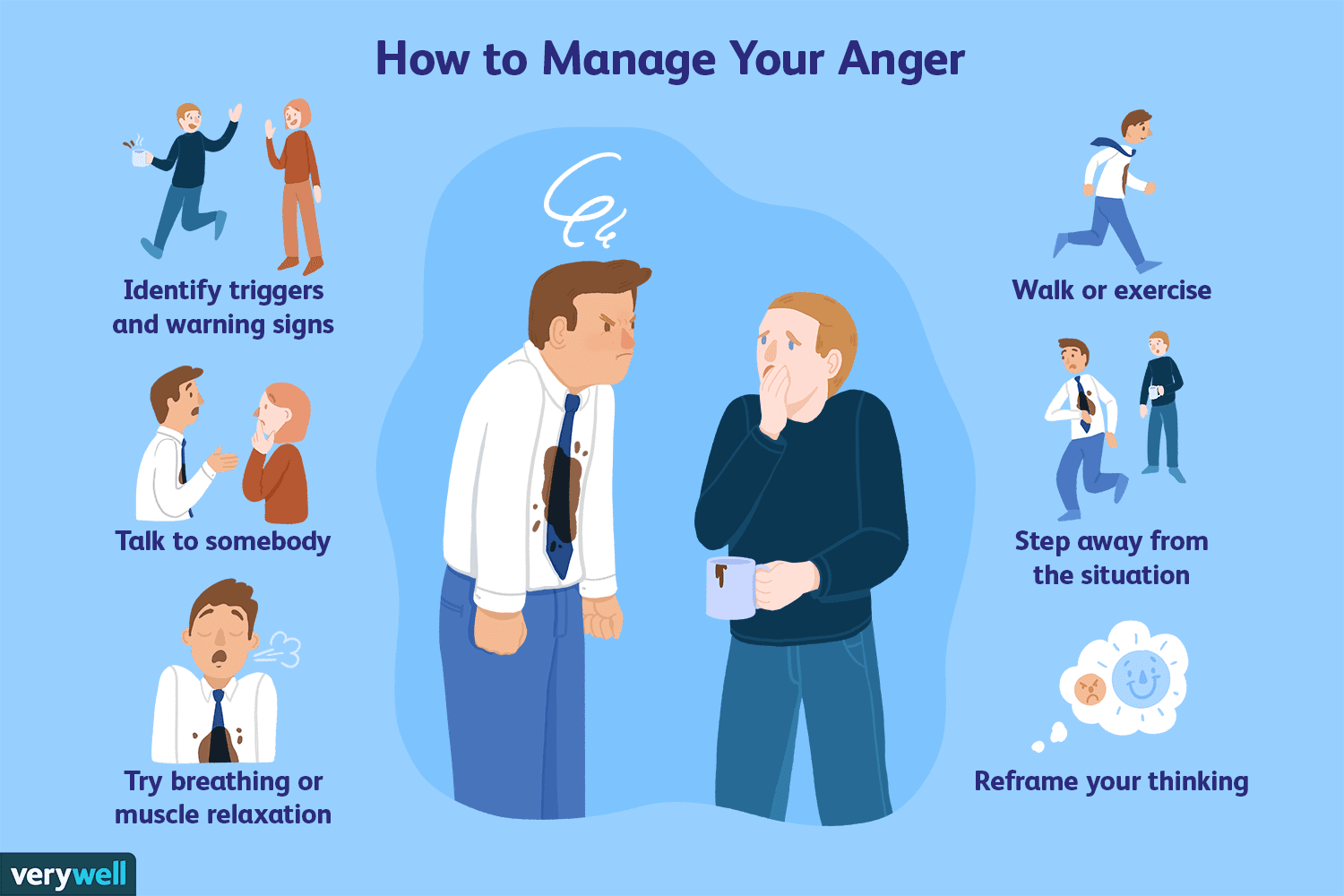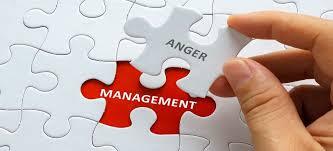There are many ways to deal with your anger. They all involve taking control of the situation. This blog post will give you 12 techniques that you can use to take back control and manage your anger in a positive way. These anger management techniques include deep breathing, meditation, mindful eating/mindful drinking, using a distraction technique like counting or reading.
Contents
What is Anger Management?

Anger is the emotional response that manifests when a person feels an injustice or offense has been committed against them. You may feel angry because of something someone said, did to you, or didn’t do for you (like not holding the door open). The anger will make your blood boil and it might happen spontaneously without warning. However, there are also situations where people choose to turn on their rage deliberately; this happens most often with people who have had time to contemplate emotionally why they should get mad at somebody.
Anger is a normal emotion. We all feel it, and we need to learn how to control our anger. If you can’t manage your emotions like anger, the result will be disastrous for everyone. Hence, anger management techniques help you deal with strong feelings before they escalate into destructive behavior.
What Makes A Person Angry At The Workplace?
Anger can occur due to different things that happen at work. It could be a colleague who keeps bragging about him or herself, someone who steals your work, or even an unhelpful coworker. Let us say you feel angry because of something that happened at work. The first thing you might want to do is try to identify what it was that made you angry so you can find the best way to deal with it. Here are some ways:
- You could ask for help from your supervisor
- You could go outside and take deep breaths
- Or you could call a friend
- Or, if all else fails, you might need to walk away
We need to learn how to watch ourselves. This will help you understand what makes you angry? It is hard for us to control our anger because we don’t know why it happens.
Why Manage Anger At Workplace?
Anger is a normal emotion, but when it is uncontrolled and you don’t know how to manage anger then it can lead to many problems not only for yourself but also at your workplace.
It leads towards destructive behavior which may create issues with the co-workers and bosses of people who work together in any organization. It will even affect their personal relationships outside of the office. Researchers connect this uncontrolled anger to an increased risk of cardiovascular diseases such as heart attack or stroke. There are some other potential effects such as depression, anxiety, etc., if this habit continues over time. So we need emotional intelligence techniques urgently so that we can get rid of these horrible consequences brought on due to our own uncontrolled anger.
Anger Management Techniques

By using deep breathing or other strategies to cool down your anger before making judgments, you will be able to make better decisions. Learning how to express oneself assertively rather than violently is a great way for individuals who are prone to verbal aggression to set boundaries without screaming at the person they’re furious with.
Build Emotional Resilience
If you are an angry person, you can have a plan with steps on how to solve your anger problems. This can be done by being relaxed or mindful or meditating. If you find yourself getting angry often in certain situations, it will help if you have an “anger problem solving” plan so that you know exactly what to do when your temper flares up.
Meditate Mindfully
You can learn to meditate and forgive yourself for getting mad. Meditation will help you focus on your breathing, which can get you out of bad moods. You need to know how not to be angry again because it’s possible!
Create an Anger Journal
In order to make better decisions in life, try a technique called the anger journal. Write down all the things that you get really angry about. Then next time something angers you, think about it before deciding what to do right away.
Write Down What Fuels Your Anger
When you are angry, write down what makes you angry. Once you do that, think about how to change the situation or if there is something that can make it better. This will help with future situations and get rid of unnecessary stress!
Don’t Say Anything
When someone makes you angry, it is okay to not say anything. When they are mad too, the argument will get worse if you speak. Sometimes when people are mad at each other, it is good to wait for some time before seeing each other again. This will help us calm down and then when we meet up again it will be better.
Workplace Yoga
When you are angry, do some yoga. Yoga will help bring your anger down so that it is easier to not react when someone makes you mad.
Do Something Useful
When you get angry, try to do something like cleaning or exercising. This might be hard because of the frustration, but keep trying. Eventually, it will work! You just have to believe in yourself and how good you feel when you finish doing something useful!
Monitor Your Body Language
Anger is a bad feeling and you can control it by watching how you move. It is not good to hit something or someone when angry. If this happens, try holding onto rubber balls that are bouncy.
When people see others who are mad easily, it makes them feel the same way. It is important to be with friends or family who are calmer instead of more stressed out about our problems. This way we know that there are always better things than getting upset at everything right away! Take things easy and slow down if needed so that you don’t overreact again. Being around positive people makes a huge difference because their behavior rubs off on ours.
Anger Management Diet
Your mood is affected by what you eat. Some foods that help reduce stress and anger are omega-three fatty acids, vitamin C, and magnesium.
Become a Control Freak
When bad things happen, we get angry. You can control this by being a “control freak.” When you first realize something is wrong and has happened, think about what you need to do before you react. People who are not natural-born leaders do better when they prepare themselves before doing anything involving decisions or talking about what is wrong/right with something. When people take time to think carefully before speaking up against other’s opinions, much less fighting occurs from misunderstandings!
Practice Compassion
People who are compassionate and calm, not angry or stressed out all the time, will see that others feel this way too. If we show kindness, then people will want to do the same for us!
When you get angry at someone, try to be more kind to yourself. You can think about what happened in a better way. If things don’t go well, try to do something nice for yourself. The next time this happens, think back on how much better your life has become since you stopped being angry all the time!
Listen to Calming Music
Music is a great way to calm down. Listen to some calming music on your phone or computer when you are feeling stressed, upset, and angry!
Take a Time Out
When someone is angry and you can’t solve the problem, walk away for a while. It will help them cool off and then you can come back together and talk about how mad you both are.
Cognitive Behavioural Therapy
This is a technique that helps people when they are mad. They can change how they think about something that another person has done to them. This will help them stop being mad and understand the other person’s feelings.
Do Something Fun
If something goes wrong, do something fun with other people or by yourself. Go for a walk outside and talk about good things happening today! If you can’t do that, find some time to be alone where nobody knows where you are.
Emphasize on Positive Work Culture
Some people get angry when employees are mad at work. This makes them feel bad when they see the person who is upset. They might not want to do a lot of work if everyone is trying to make sure that no one gets upset for no reason again (though they should be happy if someone else gets credit for what they’ve done). This would mean practicing new ways of thinking and showing some enthusiasm by participating in doing this, instead of saying “don’t worry” whenever something goes wrong.
Benefits of Anger Management

There are many benefits of anger management techniques. There may be some negative things about it, but overall, it will have many good effects on your life and the people around you. For example, it can lower stress levels in both yourself and other people because everyone feels better when they don’t act out with intense emotions like anger or rage. This means fewer physical symptoms such as high blood pressure, heart problems, etc.
If we don’t get angry, we will feel calmer and interact with other people better. This is important if you need to control your anger while you are at work. Not getting angry also teaches children not to act out and how to avoid situations that make them angry.
People who get angry easily can be seen as aggressive and this is not good quality. But it is also bad for relationships with other people because of our actions. Anger management techniques help you to have more freedom, less stress, and keep your job. You need to learn how to control your anger. Anger is important for children and teenagers because it teaches them not to act out and also to avoid situations that make them mad. It is important for children and teens to be able to control their emotions such as sadness or fear, so you should teach them the way of doing it when they are young.
Conclusion
The anger management techniques below will help you better understand your feelings and how to manage them. If you are feeling frustrated, let us know! We can provide resources that may be helpful for managing your emotions. People often feel scared of their own thoughts; it’s okay not to feel like yourself all the time! Acknowledge when something is bothering you. When we are angry, it can be hard to control our feelings. It is important that we acknowledge them and do something about them.
Do you want to get rid of anger issues at the workplace? Join our corporate online therapy program and get personalized therapy sessions to help you control anger issues.


